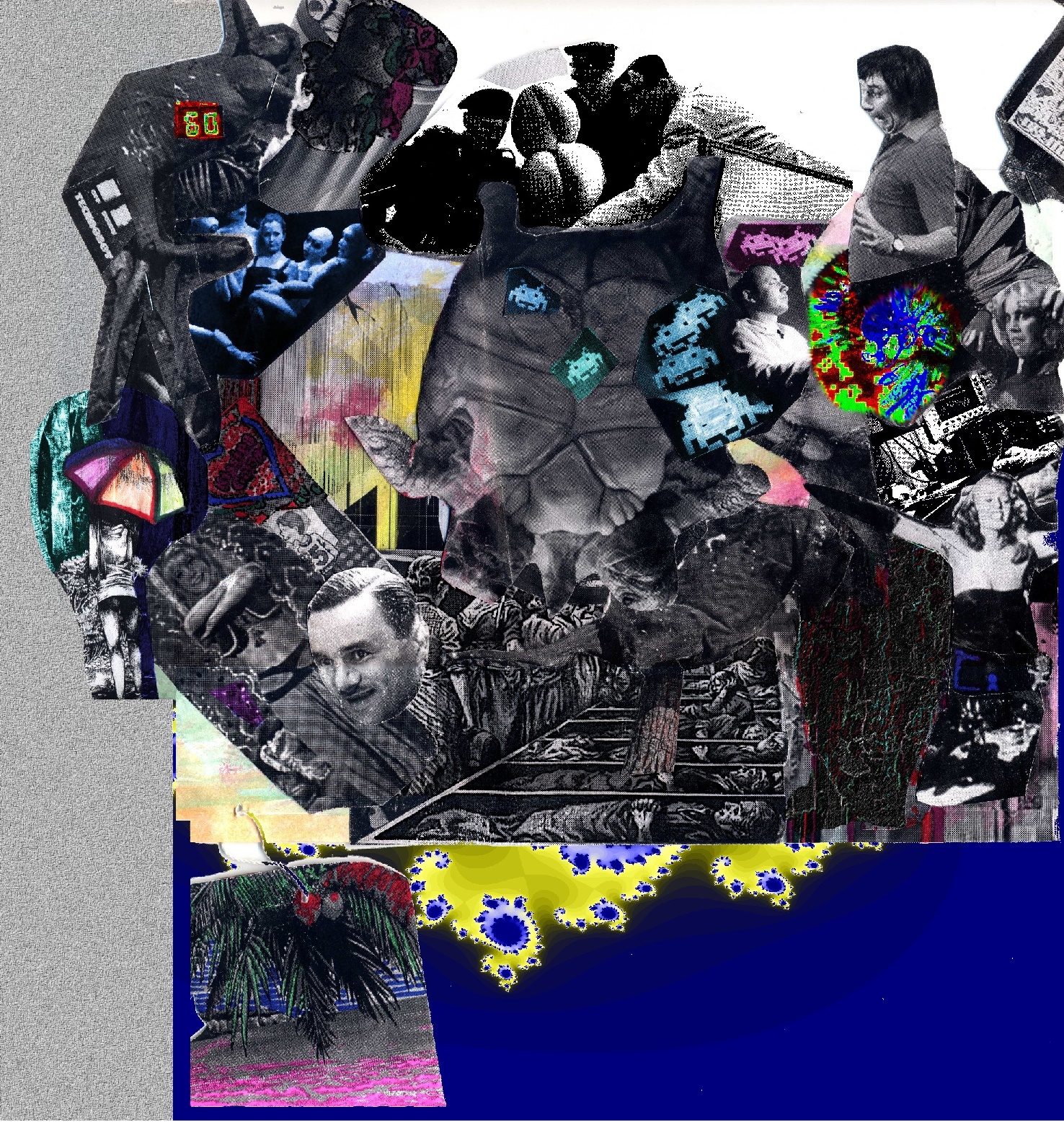

Edward Ka-Spel’s brilliance with The Legendary Pink Dots is to introduce us to isolated characters and then immerse us in their world-view through expansive and mysterious soundscapes. He begins with the most restricted, infinitesimal point of consciousness and then slowly expands it outward towards a state of ‘cosmic consciousness’ (to use the phrase of 1960s psychonauts). Musically, he often follows this template of expansion, with simple melody lines repeating and layering in increased complexity of texture. Much of the LPD’s music is an undertaking to help the listener (and perhaps composer) escape his/her own head. Lyrical phrases, musical motifs, album titles and themes recur across decades, but tonal shifts between albums are slow and subtle. Hopefully, The Legendary Dots Project, like the Residents and Sparks projects before, will provide the keen reader and listener with a giddy entry-point into the Legendary Pink Dots’ musical world. Fulfil the prophecy!—
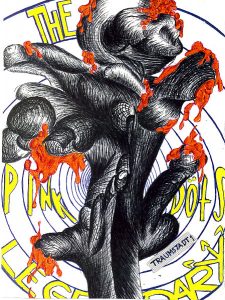
Adam:
Traumstadt 1 (1988) is not really a compilation album, though it is listed on Discogs as such. It comprises a re-release of Atomic Roses and Apparition from 1982. When Tom, Matt and I originally reviewed those two albums three years ago, I concluded that Atomic Roses was murky and uninviting and that Apparition was cryptic but decidedly more intriguing. Since these feelings still hold, I will spend the time here briefly discussing the tracks from those two albums that I neglected in the original reviews before moving onto the three new additions: ‘No Bell No Prize’ (here in its ‘Version Ridiculous’ iteration), ‘Close Your Eyes, You Can Be A Space Captain’ and ‘I Dream of Jeannie’ – although none of these three appear all together on any single pressing of Traumstadt 1, but might be considered bonus tracks spread out between the American CD release and the Dutch and German cassette releases.
So, the tracks from Atomic Roses:
‘Of All The Girls’ starts like the heart of an asthmatic old man being shocked back into rhythm. He arises, wheezing back to life, stumbling from the operating table, snippets from half-remembered 1940s films dancing round his head. I managed to identify samples from Casablanca (1942) and Howard Hawks’ The Big Sleep (1946). ‘Playschool’ sounds like a nasty bout of sinusitis suffered in a history lesson in the future where all classes are taught by computers. ‘Sex’ is a bit sprightlier – though it’s still a matter of trying to skip through sludge, with Ka-Spel cheekily singing about S&M themes.
Sally Graves’ monologue in ‘Passing Thought’ makes for one of the most directly relatable passages of early Dots: “Having lost hope, I’m losing respect for life and its offerings/ Decaying surroundings that I once loved/ Numbness; oblivion; dispassionate void.” Droning atonal flue accompanies. This tiny, lyrical passage is like a fragment from Sarah Kane’s emotionally stark one-act play Crave (1998) written towards the end of the playwright’s life.
‘Atomic Roses #1’ and ‘Atomic Roses #2’ are both (intentionally) over-loaded, waveforms spliced mid-peak. They sound like they’ve been recorded with dying machines. ‘Ideal Home’ is sandwiched between the two and provides something of a respite, with its acoustic sound and comparatively chilled rhythms, despite Edward’s talk of dropping people in an acid bath – a lyric which justified the inclusion of fellow OCD sufferer and acid bath murderer John Haigh in my Traumstadt 1 collage.
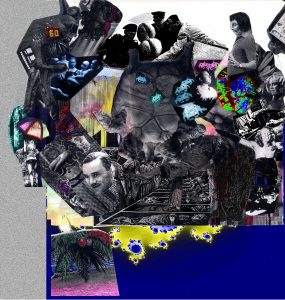
—
On to Apparition and ‘God Speed’ begins with the sound of nothing so much as rats gnawing through the power cable of an electronic bingo machine. A bass sound as squelchy as anything from Aphex Twin’s Come to Daddy EP (1997) keeps time with a drum loop that crashes in like the iconic percussion to New Order’s 12-inch single ‘Blue Monday’ (1983). Edward’s a little lost in the mix, but it’s the music which compels here. There’s some downright evil white noise and howling explosion sounds around the 2:00 minute mark. Turn it up loud on your headphones.
‘Pay To Be Alone’ captures the bleak absurdity of having to pay society in order to be left alone by society – the protagonist holed up in his apartment with only the television for company. The repetition of ‘pay, pay, pay’ starts to sound almost indistinguishable from ‘pain, pain, pain’ and the repeated ascending melody has an appropriately numbing effect. The song becomes unexpectedly layered, mostly with washing drones of nauseous synth. By contrast, the following track, ‘Spontaneous Human Combustion’, is absolutely gorgeous in spite of the title!
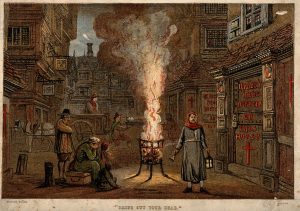
‘The Plague’ is utterly silly Halloween ghoulishness, with none of the existentialist ethics of 1947 novel of the same name. Edward certainly sounds like he’s having fun, delivering lines like “We’ve all got the plague! We’re all gonna die!” like the cackling villain of a Hammer Horror film. Funkier though ultimately less atmospheric than Bauhaus’ spiritually similar ‘Bela Lugosi’s Dead’ (1982). Still, worth checking out as it captures a rambunctious aspect of the early Dots not always captured on record. Here they sound like a live band, rather than an assembly of studio experimenters.
—
The first of the new tracks, ‘No Bell No Prize’ (or, at least, the first of the Traumstadt tracks completely new to me) comes from Xtract’s 1984 Three Minute Symphony compilation, in which the Dots are featured alongside artists such as Kill Ugly Pop, Nurse With Wound, Merzbow and Asmus Tietchens. The Dots’ contribution has snatches of the arcade field recording (?) of ‘God Speed’ and is a vortex of anguished howling which dissipates in the face of a crystalline melody and a melancholic tale of a suicide victim condemned to eternity in Hell where she can “play all day”. It’s slight, but unsettling – a worthy B-side to Suicide’s ‘Frankie Teardrop’ (1977).
‘Close Your Eyes, You Can Be a Space Captain’ is one of the Dots’ earliest forays into ambient psychedelica. It risks becoming a dirge with its funeral lyrics of satanic ritual and whisky-stinking “death breath”, but effective dynamics happily prevent this. ‘CYEYCBaSC’ sets the template for later, long-form Dots digressions, such as the many ‘Premonition’ pieces.
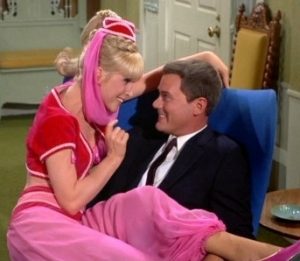
Finally, ‘I Dream of Jeannie’ is an incredibly perverse deconstruction of the 1965-1970 American sitcom of the same name about a perky genie keen to serve her straight-laced rescuer Tony – mishaps ensue! The song includes one of the most malevolent synth grids the Dots have ever conjured. The lyrics are genuinely unpleasant, but manage to ridicule the gender dynamics underpinning the series.
Tom: It’s been a remarkable, frenetic time, the mere month since we wrote about Any Day Now. I have had a 20,000-plus word essay, published here in three parts, about David Edgar’s BBC TV Play for Today ‘Destiny’ (1978). Theresa May’s Tories are humbled, denied a majority by the British people, despite the “Strong and Stable” One’s impudent request for a landslide. The horrible cost of Britain’s decades of “on the cheap”, profit-over-safety neoliberalism is becoming increasingly clear: the Grenfell tower block fire marks a sea-change where a critical mass of people will surely say: no more, enough of this sort of politics and country. Out of horrors, hope emerges…
And now, on my Friday afternoon off work, nearing the end of another academic year teaching, I can sit back and reflect on the new tracks on Traumstadt 1… ‘No Bell, No Prize’ is a slow, dazed fairground canter with percussive sounds like pots and pans in the sky of a Magritte painting. It is typically macabre, deadened stuff: “Sylvie loves to play all day… Shame…”
The title of ‘Close Your Eyes, You Can Be a Space Captain’ evokes the spaced-out late 1960s dreams of space: awe-filled bleakness of Kubrick’s 2001: A Space Odyssey (1968) and Bowie’s hit ‘Space Oddity’ (1969). Yet, the lyrics are a blend of the mundane and the horror film: “A foetus in the sink / The stink of days’ old whisky on his breath”. We’ve heard some of this before in ‘Space Captain No. 1’ from Prayer for Aradia (1985): “You could be a film star, you could be a pop star, you could be anything…! … You want to…” Vaguely Gregorian chanting occurs after the four-minute mark. This gives way to comical and / or disturbing wails, which sound like men forced at bayonet point to imitate babies. Then we have a slow patchwork of sounds, stretching out to many minutes; from which finally emerges a distant, submerged horror film organ backed by forceful, dank percussion.
Rather like ‘Poppy Day’, ‘I Dream of Jeannie’ begins with a mournful, circling melody. Ka-Spel’s lyrics flow ceaselessly, making use of enjambment. The ‘her’ is unnamed; a ‘pimp’ and a ‘pusher’ are identified. As Adam argues, the lyrics both detail and derail pulp fictions from Hollywood and the tabloid media: “Another Yankee in the jail, another movie / One more headline, one more headline”. EK-S’s weary, anguished delivery says it all. These last words are heard again with Ka-Spel’s voice pitch-shifted up, helium-style. It then moves into a brisker end-section, with squelching synths and a series of desperate imperative verb phrases: “roll it up and lick it squeeze it roll it up and use again again again swallow swallow”. Grotesquery aplenty, with prostitution and death intermingling.
